Extension Food Safety Experts Help an Apple Farm Expand Its Business
go.ncsu.edu/readext?915193
en Español / em Português
El inglés es el idioma de control de esta página. En la medida en que haya algún conflicto entre la traducción al inglés y la traducción, el inglés prevalece.
Al hacer clic en el enlace de traducción se activa un servicio de traducción gratuito para convertir la página al español. Al igual que con cualquier traducción por Internet, la conversión no es sensible al contexto y puede que no traduzca el texto en su significado original. NC State Extension no garantiza la exactitud del texto traducido. Por favor, tenga en cuenta que algunas aplicaciones y/o servicios pueden no funcionar como se espera cuando se traducen.
Português
Inglês é o idioma de controle desta página. Na medida que haja algum conflito entre o texto original em Inglês e a tradução, o Inglês prevalece.
Ao clicar no link de tradução, um serviço gratuito de tradução será ativado para converter a página para o Português. Como em qualquer tradução pela internet, a conversão não é sensivel ao contexto e pode não ocorrer a tradução para o significado orginal. O serviço de Extensão da Carolina do Norte (NC State Extension) não garante a exatidão do texto traduzido. Por favor, observe que algumas funções ou serviços podem não funcionar como esperado após a tradução.
English
English is the controlling language of this page. To the extent there is any conflict between the English text and the translation, English controls.
Clicking on the translation link activates a free translation service to convert the page to Spanish. As with any Internet translation, the conversion is not context-sensitive and may not translate the text to its original meaning. NC State Extension does not guarantee the accuracy of the translated text. Please note that some applications and/or services may not function as expected when translated.
Collapse ▲It’s a typically busy day at Flavor Full Farms, a family-owned apple farm in Henderson County. Jeff Nix is in the packing house, supervising the workers sorting through the red delicious, galas, pink ladies, fujis, granny smiths and other varieties while researching machines to dry the floor that’s persistently damp because of high humidity levels. His wife, Dale, is in the office, going over the books and ordering supplies. Their son, Jerred, is making sure everything is running smoothly in the slicing room.
But everything stops when Elena Rogers stops in for a visit. The NC State Extension agent draws the family like a magnet. Dale breaks into a big smile and greets her with an enthusiastic hug. Jeff and Jerred playfully tease her.
Rogers is Extension’s area specialized agent for food safety and fresh produce in western North Carolina.
“I work with growers, lining up their food and safety practices from the moment a crop is put in the ground until it’s sold,” she said. “I make sure packing house workers understand how to handle produce and reduce the risk of food-borne illness. We provide the resources and scientific knowledge so growers know how to develop long-term programs. In helping them see the value of food safety, we are ultimately protecting public health.”
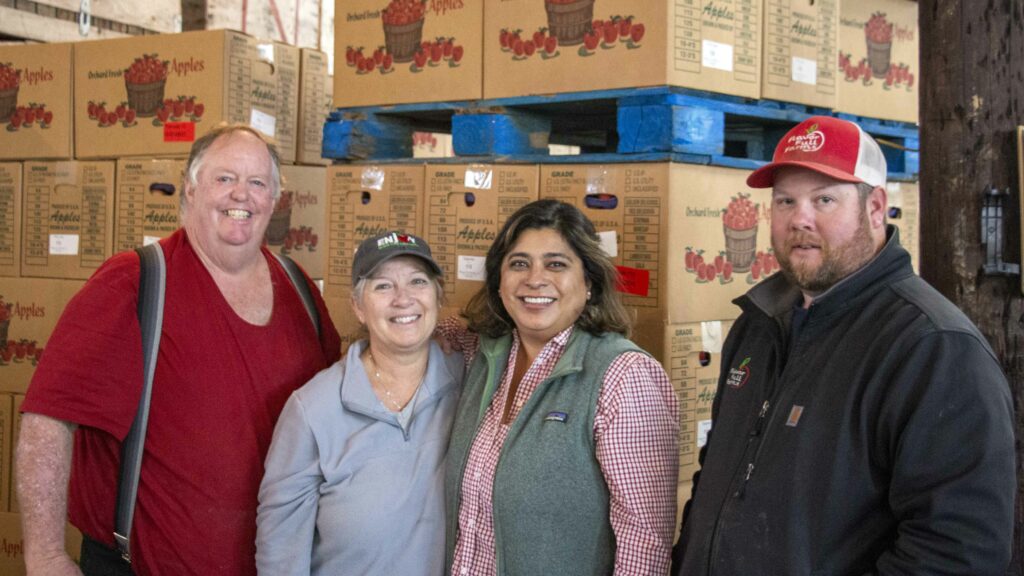
NC State Extension food safety field agent Elena Rogers (second from right) with Jeff, Dale and Jerred Nix of Flavor Full Farms.
But she’s clearly much more than a vital resource to the Nix family. She’s a friend, a confidant, and, along with Lynette Johnston and her Raleigh-based team, key to the farm’s success.
“If it hadn’t been for Elena and Lynette, oh my goodness, I don’t know how we could be operating,” Dale said.
Johnston is an Extension food safety expert and NC State assistant professor.
“I work one-on-one with companies to help them reduce their food safety risks and also help them comply with food safety regulations,” Johnston said. “The laws and regulations can be a bit onerous to companies, but I like to say if we can make your product safer, we can in turn improve the quality of your product and expand your market.”
Rogers and Johnston worked with Flavor Full Farms to provide the knowhow to safely operate the packing house and, crucially, the advanced knowledge in sanitation methods that allowed them to launch the apple slicing business.
“From a farmer’s standpoint, if it wasn’t for them we’d be in trouble,” Jeff said. “I’ve been in this all my life and I’ve learned a lot of things, but I didn’t know about food safety. If it wasn’t for them helping us the way they do … So many farmers are scared to ask for their help. They are still in that manlihood thing, well I’ll figure it out. It don’t work like that.”
Johnston is proud of the food safety curriculum she and her team put together, and is glad the training worked for Flavor Full Farms.
“They were quick learners,” she said. “I was so impressed with Dale. They put safety as a priority. It wasn’t just, ‘I’m doing this so I can check a box and sell my product.’ They took it seriously.”
If Johnston is impressed with her student, it pales in comparison with how Dale feels about her teacher. Dale looks back on the time investment Johnston made in Flavor Full Farms, and a common theme emerges. Above and beyond.
Johnston has made a couple of visits to the farm, the first in 2021 to help them get up and running.
“It was August and we were packing,” Dale said. “Getting to Raleigh for a three-day training was not an option. Lynette actually brought the training here so I didn’t have to leave.”
She made a return trip before the current slicing season, which runs from the fall into the middle of March.
“She asked, ‘What can we do? I want you to be ready when the season opens because you are going to hit the ground running,’” Dale said. “She spent two whole days here. Lynette has got me at such a comfort level. I’m like, I can do anything!”
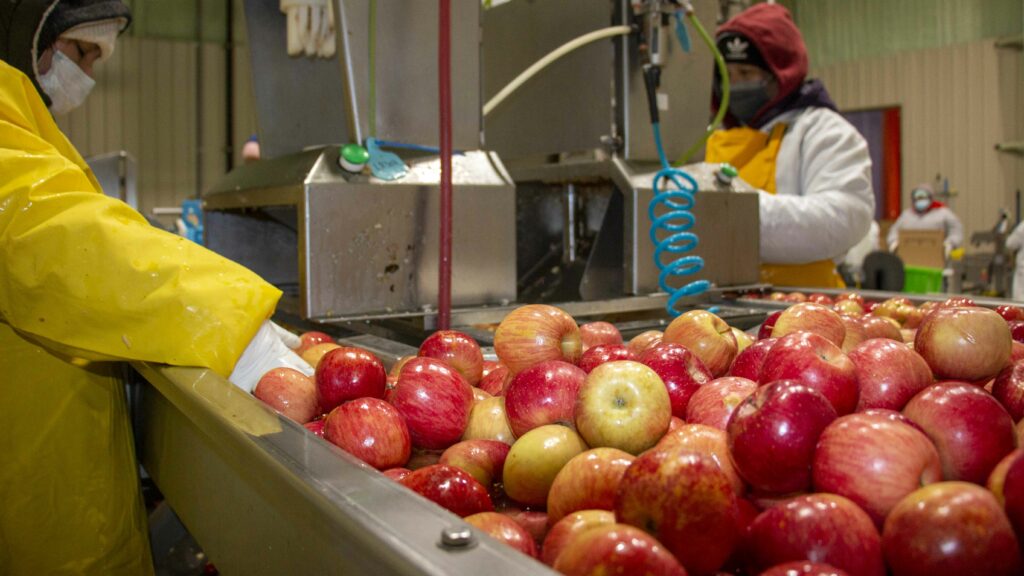
Fresh apples before having the cores removed, the first step in the apple slicing process at Flavor Full Farms.
When Johnston considers the time investment, her perspective is markedly different.
“Extension is all about building relationships,” she said. “Is it normal to be working on a weekend or long hours? Absolutely. Because our processors work on weekends, and they work long hours. To make an impact, I think you’ve got to meet the processors where they’re at. It’s something I like to foster in our program and our team’s approach with every stakeholder we work with. I think it’s extremely important.”
Her family was the recipient of help from Extension agents when she was growing up on a dairy farm in the panhandle of Texas, and that helps inform her work ethic.
“My dad had to comply with regulations,” she said. “I saw the county agent and the people that helped him make his business successful. I just want to pass that on.”
Johnston considers going the extra mile, working on weekends, doing whatever it takes to impart the needed knowledge, as part of the job description.
“I love the purpose of Extension,” she said. “It’s all about service, and helping people find solutions. If we can help someone find the answer I feel like we’re doing our job.”
Johnston and her team, along with Rogers, certainly provided the needed solutions for Flavor Full Farms.
Jeff Nix has been growing apples on family land outside of Hendersonville all of his adult life. Truth be told, like a lot of farm kids, even before his adult life.
“He started driving a tractor when he was 8,” Dale said. “Farming with his daddy, that’s all he’s ever done.”
Homegrown: How Sweet It Is — North Carolina’s Apple Economy
His grandfather and father before him were noted for growing some of the tastiest apples around. When Jeff assumed control of the operation, he began exploring ways to expand the business. Dale, his wife of 37 years, calls him a visionary.
“He always wanted to tour places that were doing something new,” Dale said. “He’s toured Washington state, he’s been to Cornell in New York, to see what they’re doing.”
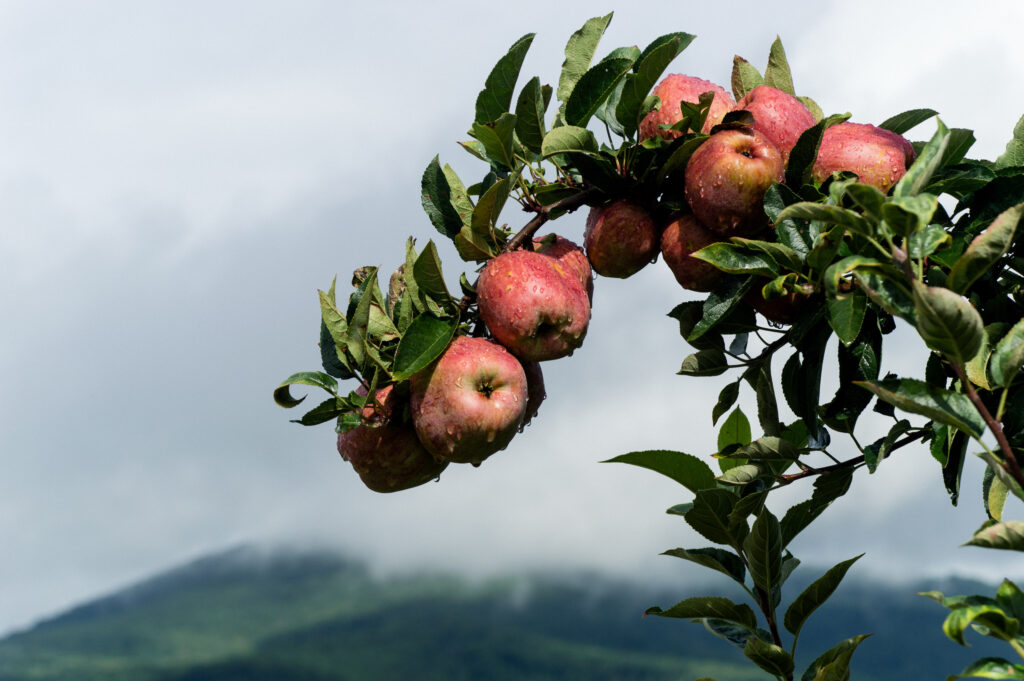
Apples growing in an orchard in western North Carolina. NC State Extension experts help ensure a healthy crop in the No. 7 apple-producing state in the country.
He learned about high density orchards in New York, and was one of the first to implement the practice in western North Carolina. He added the packing house in 2018, enabling Flavor Full Farms to sell apples directly to markets rather than to other packing houses.
That’s when the Nixes first came into contact with NC State Extension staff. Rogers, the field agent, introduced them to Johnston, who walked them through the regulatory process to ensure they complied with federal and state sanitation standards.
Opening the packing house was a difficult decision. It required an investment in time and staff, and a commitment to food safety. But it was nothing compared to what came next — launching the slicing operation.
“Jeff saw an apple slicing operation in Washington state 20 years ago,” Dale said. “He came home and said one day I’ll slice apples. I was like, ‘you’re crazy.’”
Start-up costs and the lack of market opportunities put the idea on the back burner for a couple of decades. Then a market unexpectedly opened up when the person who had a contract to provide sliced apples for school lunches in western North Carolina died last spring. Flavor Full Farms had the opportunity to pick up the contract, but two obstacles remained. The Nixes needed equipment, and they needed knowledge.
Related: Extension helps connect youth to healthy local food through the Farm to School program.
The first part was relatively simple. Jeff weighed the startup costs against the expected return on investment. There was risk, certainly, but the time was right to implement his vision from long ago.
“We used to sell at the farmers market, which is awesome,” Jeff said. “We had a roadside stand for 13 years. That’s awesome. We were ready for that next level. To get there, you’ve got to be ready to take on all it encompasses.”
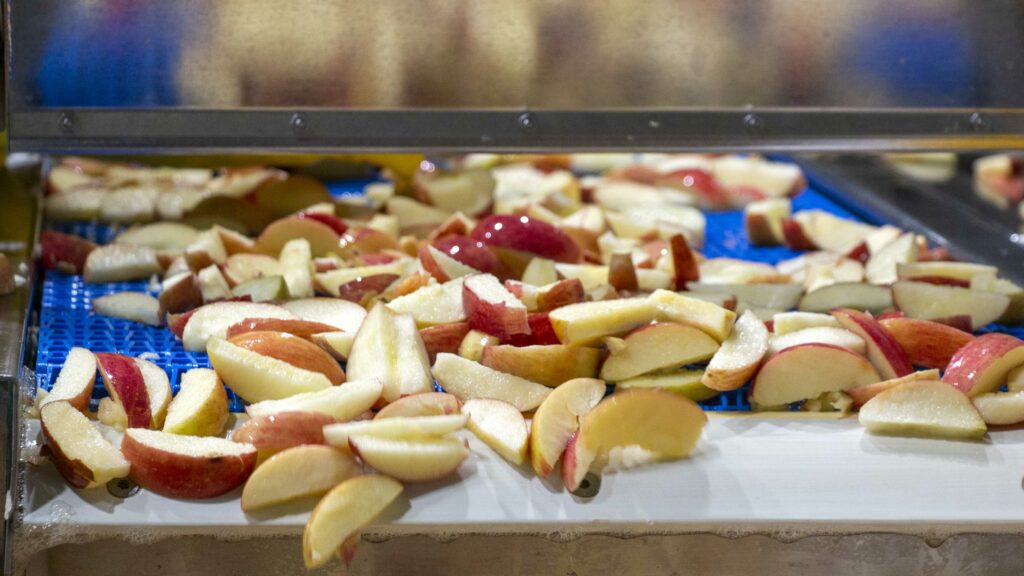
Sliced apples at Flavor Full Farms before being packaged for school lunches. NC State Extension food safety specialists help ensure they are safe to eat.
The second part was much more complex. The safety requirements for running a slicing operation are exponentially higher than for a packing house.
“This is such a complex world,” Rogers said. “You have the costs, everything that it takes to begin an operation. On top of that, you add food safety. That’s like, oh my goodness, a nightmare. As a field person I said, ‘Do you realize the risks? Do you realize this isn’t the same as just washing apples and putting them in a bag?’”
Food safety requirements are extremely stringent for ready to eat products. When the skin of the fruit is broken, there is the potential for pathogenic contamination. Many can cause serious illness and even death.
“You can’t get it wrong,” Rogers said. “An outbreak would be devastating.”
The only possible way to turn the prospective nightmare into a fulfillment of Jeff’s dream was to rely on the expertise of the Extension food safety team.
“I had met Lynette through certifications for the packing side through Extension,” Dale said. “When we started this, I was like, she’s my girl, I’ve got to find her. If it hadn’t been for her and Elena, I don’t know how we could have started.”
At the most basic level, the training can be broken down into two major components. The first is knowing the danger.
“They are harvesting fresh apples, followed by coring and slicing ,” Johnston said. “There’s no cook step, or kill step, that would reduce any sort of pathogenic contamination if it was present. Because the product is ready to eat and is consumed by children, food safety measures are a must.”
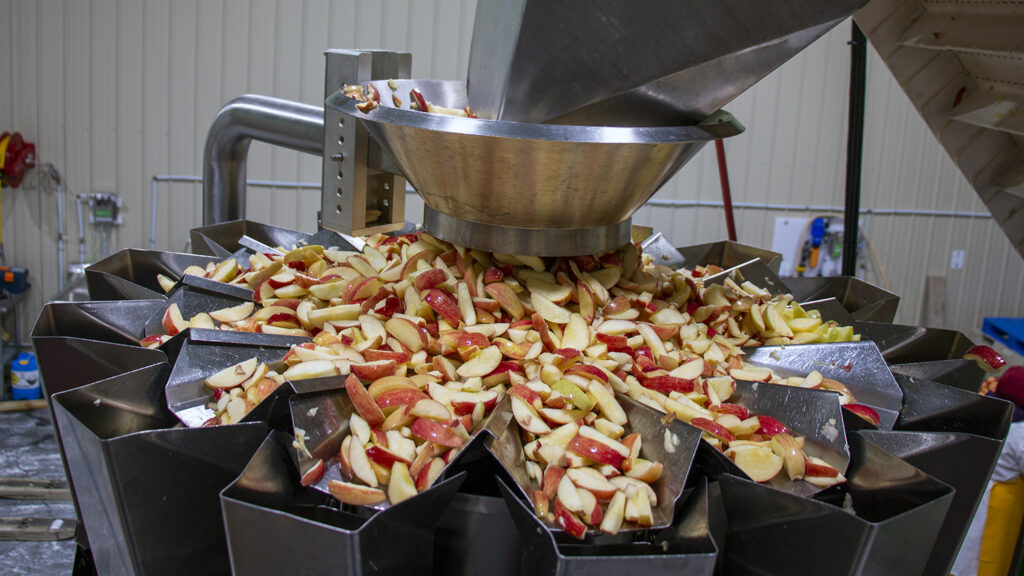
Fresh apples slices from Flavor Full Farms will help provide nutrition to North Carolina school children.
It’s not enough to know there is an invisible enemy. It is also important to know the specific bacteria and pathogens that can cause an outbreak of illness and shut down a business.
“A big part is knowing the food safety language,” Dale said. “I would go through this course, and she would say things like monocytogenes. I don’t know what monocytogenes are. She talked about listeria. I didn’t know what that was. This girl has held my hand. She has taught me everything.”
The second important component to the training is knowing how to inspect the facility for microscopic predators, and taking steps to eliminate any hot spots if detected.
“Lynette spent two whole days here, and we did nothing but environmental monitoring training,” Dale said. “She said I want you to know this inside out. She showed me how to swab from top to bottom, left to right, under stuff, on stuff, in stuff. It does matter to me. I want to know if there’s a problem. If I have a positive, do I want to correct it? Absolutely. But I want to know where it is, how it got there, why I have it, and how we are going to prevent it. She brought me to that level of comfort.”
The personal attention from Johnston and Rogers, and the knowledge they have imparted, has been instrumental in Flavor Full Farms’ ability to safely expand its business.
“When you supply to kids, you put their lives in your hands,” Jeff said. “With the help of Lynette and Elena, I know what we need to make everything safe. When it leaves that dock, it’s got my name on it. My name is worth more to me than all the money in this place.”

